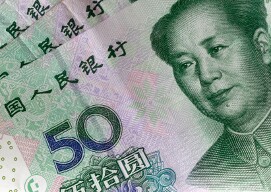The Chinese yuan is mixed at the end of the trading week as the market weighs the Peopleâs Bank of China (PBOC)âs long-postponed measure to overhaul interest rates. Investors might also be anxious over new data that found soaring debt levels and rising unemployment in the worldâs second-largest economy could threaten stimulus initiatives. Other reports suggest the US wants Beijing to “double or triple” its offer to purchase American goods has not helped the currency.
It is being reported that PBOC policymakers are thinking about finally abolishing the current interest rate benchmark this year. The objective would be to decrease the number of tools at the PBOCâs disposal that controls the price of money over a short period of time. Central bank heads â Governor Yi Gang, monetary department director Sun Guofeng, and PBOC adviser Sheng Songcheng â are all coming out in favor of the move.
The sudden support for this policy comes as the current system does not help areas of the economy that need assistance. For example, the rate that financial institutions pay to borrow from each other has fallen over the last 18 months, small businesses are still seeing higher credit costs.
Moving forward, Beijing wants to correct this gap.
As the economy cools down, the federal government is witnessing two growing issues that threaten its stimulus efforts to rejuvenate the economy: unemployment and debt. The unemployment rate continues to gradually inch higher; the jobless rate climbed from 4.9% in December to 5.3% in January and February, the highest level in two years.
While governments and corporations embark upon a deleveraging campaign and try to slash their debt volumes, households are borrowing at the fastest pace since the global financial crisis. Today, household debt, which includes credit cards and mortgages, represents more than half of the gross domestic product (GDP).
Credit card is a major problem for the economy as it surged to 7.5% of the GDP last year. At the same time, the credit card delinquency ratio has spiked.
Despite reports that the worldâs two largest economies were inching closer to striking a trade agreement, a new report finds that both sides have hit a bump in the road. Although Beijing has made a number of concessions and pledged to increase its US imports, President Donald Trump has reportedly demanded that China âdouble or tripleâ its $1.2 trillion pledge to acquire more from the US.
The USD/CNY currency pair rose 0.27% to 6.7166, from an opening of 6.6984, at 14:52 GMT on Friday. The EUR/CNY tumbled 0.58% to 7.5767, from an opening of 7.6204.
If you have any questions, comments or opinions regarding the Chinese Yuan,
feel free to post them using the commentary form below.
Chinese Yuan Mixed As Market Weighs PBOCâs Overhaul to Interest Rates
